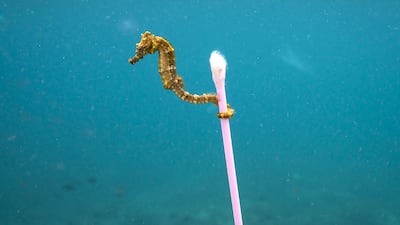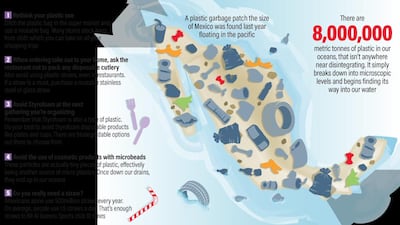A photo of one of the smallest sea creatures has elevated the marine environment’s biggest issue: the destruction of our ocean ecosystems from the rampant consumption of single-use plastics. A concern, that in the wake of Arab Environment Day, has not been given enough attention.
Scientists and conservationists in the UAE at the weekend attempted to draw attention to a “catastrophe” that is taking place in our homes and one that is likely to be responsible for global wildlife diversity in 2020 to be reduced to a third of the level it was in 1970.
Scientists have found alarmingly high levels of plastic, a non-degradable material, in oceans around the world in the form of garbage patches the size of Mexico floating in the pacific and, more detrimentally to our health, on a microscopic level which has found its way into humans’ food chain.
Last year, a report for the Ellen MacArthur Foundation estimated that, by 2050, the volume of accumulated plastics in the oceans will be greater than that of fish.
However, the extinction of marine species is likely to arrive much sooner than 2050 as the usage of single-use plastic continues to increase yearly.
“They became an inextricable part of everyday life, from bottles, to pens to the single-use plastic bag. Now plastic makes its way into the ocean, with indestructible and catastrophic effects,” said Manya Russo, marine programme officer at the Emirates Wildlife Society and the WWF.
_____________
Read More:
Tonnes of rubbish hauled from Dubai Creek by volunteer divers
Sharks Become Victims of Most Deadly Predator in the Gulf
More than 1,000 artificial caves to be installed in the UAE
_____________
The concern for the scientific community is that plastics do not biodegrade as natural processes fail to break down the petrochemical that gained popularity at the beginning of the 20th century for its very resistance to decay.
Any plastic disposed in the ocean remains there until either collected in sporadic beach clean-ups or consumed by animals and humans.
“It’s an overwhelming thought: that every bit of plastic that was ever created and made it to the ocean is still here on our Earth,” said Ms Russo.
Plastic in the marine environment causes injury and fatalities to the animals which call the ocean its home, she said.
A study by National Oceanic and Atmospheric Administration showed that around 100,000 marine mammals, including seals and whales, die every year from plastic pollution.
Even non-marine species, such as birds or reptiles, often accidentally ingest plastic, which inevitably causes their deaths by starvation. This rubbish can also be fed to their young, causing death at the very early stages of the chick’s life.
Of all land-based animals, humans might be the most susceptible to plastic-borne health concerns.
In September, a study done by scientists for Orb Media showed that 83 per cent of tap water samples around the world contain microplastics.
These microplastics also present a biological threat as tiny particles attract bacteria and pathogens found in sewage that eventually end up in food and water.
The easiest way to reduce the presence of single-use plastics is to ban or begin phasing out their consumption. Countries such as India and Kenya have issued an outright ban or have introduced a levy on plastic bags in a bid to curb usage.
An initiative announced in 2009 to make the UAE free of plastic bags by 2013 has not met its target.
Last year, when quizzed by Federal National Council members, the Ministry of Climate Change and Environment said it is working to replace the 13 billion plastic bags used in the UAE, with biodegradable alternatives.
The Minister, Dr Thani Al Zeyoudi, said the decision was made to benefit society.
The UAE restated its goals to protect its marine environment in a meeting last month ahead of COP 23, the follow-up to a transnational agreement that saw 196 countries pledge to reduce climate change to less than two degrees by 2050.
“The marine environment has been a significant component of the UAE’s environmental resources and continues to play an integral role in our everyday lives,” said Dr Thani Al Zeyoudi, Minister of Climate Change and Environment.


